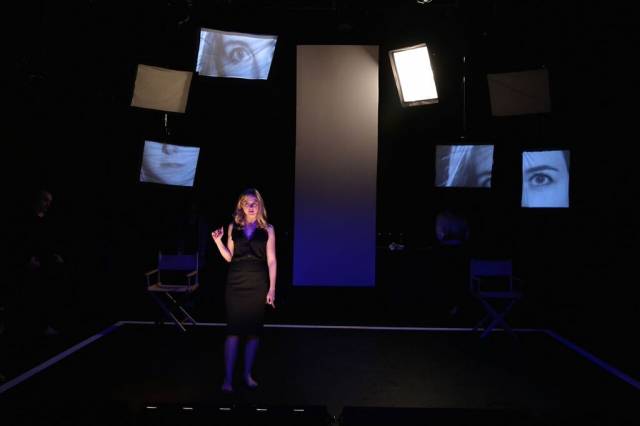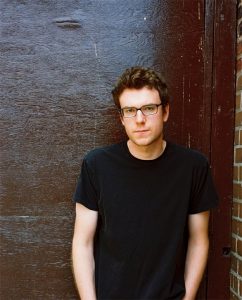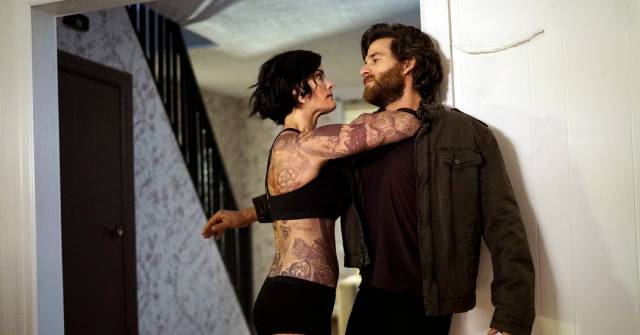

Four friends become entangled in a game of deception and seduction in Brendan Gall’s Wide Awake Hearts, an erotically charged work making its New York City debut at 59E59. Two actors, a director, and an editor working together on a movie, fail to see how fiction strangely becomes their reality, as plot twists within the film they’re shooting, unleash personal hells and uncover secrets buried in the past. Like Who’s Afraid of Virginia Woolf meets The Player, Gall masters the art of peeling the layers of each of these individuals, while paying homage to cinema.
A renowned playwright and actor in his native Canada, Gall has gained notoriety Stateside for his television writing, particularly for the NBC hit Blindspot, a thriller that seeks to uncover the mysterious past of a tattooed woman who appears in the middle of Times Square one day. As far as Blindspot’s extravagant set pieces might seem to be from the intimate scale of Wide Awake Hearts, both reveal a writer who doesn’t allow his characters to vanish in their surroundings. The people in Gall’s universe thrive with secrets the audience desperately needs to know.
I had the opportunity to talk to him about bringing his play to New York, working on Blindspot, and how theatre has rarely touched on the world of film.

You’ve been living with Wide Awake Hearts for quite some time now, how was the process of finally getting the show to New York?
The show was conceived when I was a playwright in residence at Tarragon Theatre in Toronto. I guess I started writing in 2009, and it had a production at Tarragon in 2010, it had smaller subsequent productions in Vancouver. I was very involved in the Tarragon production, I was in rehearsal every day, doing rewrites, being very collaborative with the director. I wasn’t expecting New York at all, oddly enough I’m doing a job in television which is produced in NYC, so I travel to New York quite a bit to produce episodes. I was on my way to see The Flick one day thinking how crazy it would be to have a production in NY, and then literally a week later Zorana Kydd at Birdland called with this proposal. This is a very different experience for me because it’s very hands-off, the Blindspot production is a full time job, so I couldn’t be involved in the process at all, and I’ve never had a play where I’ve just shown up on opening night to see the result, so it was interesting to go into a theatrical production sort of blind.
Writing the play at Tarragon you mentioned how grateful you were about not having to have another job while you wrote. Considering this can’t always be the case with most budding writers, what are some of your recommendations, suggestions for them?
I guess the first lesson I learned on a previous play that I tried to apply to this was in my first production at Tarragon, again I was very involved in rehearsals, but it was a room full of very smart, opinionated people, and I think I got pushed around a little bit, and as a young playwright I got very excited about the notion of making changes on the fly in reaction to people’s questions and concerns. I found myself getting lost in the forest of rewrites I was doing in the hopes of pleasing everybody in the room, which is impossible. The things that resonated with me, I was putting last. I’m not always great at articulating why something is in my play, and if I couldn’t justify it in an articulate way I thought that was a problem that needed to be addressed. As I’ve gotten older I’ve realized that sometimes you can’t explain why something is important to you, but that doesn’t make it unimportant. Also if you fix every problem, I think of it as a sheet on a bed, if you have a crumpled sheet it’s completely imperfect with valleys and peaks, and if you iron it out it makes much more sense but it’s also far less interesting. Sometimes the points where actors or directors say it’s difficult for them to get from place to place, I would try to solve those problems, but the older I get those problems aren’t just OK, but also useful and integral. With Wide Awake Hearts I tried to defend my position more, if something felt wrong to me I would say no, even if I couldn’t defend it.
You’re also an actor in movies and television, so when you sit down to write something like Wide Awake Hearts, do you worry about a “conflict of interest” so to speak and being thought of as the guy who wrote the play where all the movie people are so terrible to each other?
I mean, in some ways I think I give everyone equal amounts of terribleness, so I’m not too biased in that sense. They’re terrible, sharp and pointy people, but I think that’s how people who are vulnerable cope with being vulnerable if they don’t know how to communicate with each other in a healthy way. I love all the characters in that play and I try to approach them all with empathy, they’re tragic, broken people. I don’t think of them as terrible, just unequipped (laughs).
Right, “terrible” was not a great choice of words. They’re complex. I thought the staging was fascinating, the use of screens to project the characters’ inner lives made me think of Bergman’s Persona. Did you have any specific cinematic influences in mind when you wrote the play?
I was certainly very interested in what theatre could tell us about film, I think that there’s a lot of movies that deal with theatre, but there’s not too many that do the opposite. There was something interesting to me about those two worlds, which at first glance are quite similar, but have very big differences in terms of what they cost people and the structure for the making of these things. I had this opening image that I sat with for a very long time, and I had a structure I was interested in exploring, that was sort of mathematical. I had this notion of characters getting ripped from the scene they were in to (snaps) a different scene in a moment. I knew I wanted to deal with love, trust and art in a way, but I wasn’t thinking specifically about filmmakers in particular.
When you work on so many different fields, do you try to see projects in each of them? Did you imagine what Wide Awake Hearts would be as a film for instance?

A little bit, but that comes later. It’s something you think about once you’re in tech, watching the run you wonder what the movie version would be. What I like about the play is that it uses the movie industry as a backdrop for friends, couples, relationships and the difficulties of that. The film industry is secondary to the relationships of these old friends.
You wrote episode five of the first season of Blindspot, how was it to come into a world filled with characters someone else created, and which will continue to exist even past the episode you wrote?
In some ways it’s funny, when I first started writing in television I was sort of astonished by how much it resembled collective theatre creation. A healthy TV writing room is a lot like creative creation because it’s a lot like best idea wins, it’s a room of smart people who are all attacking or circling the same problem. You’ve got a boss, the showrunner, or head writer, sometimes the same person like with Martin Gero in Blindspot, who definitely says yes or no and tells you what direction things should go on. We’re all trying to figure out who these characters are, what their big arcs are, how they collide with each other, what the episodic stories are. Even if episode five has my name of it, every writer in that room has made their mark on it, the same way I’ve made a mark on scripts without my name on them. I really like that collaborative system, by the end you know you’ve done this intense diligence of making the best script you can.
Sounds like sitting in one of those writing sessions is as exciting as watching the episodes.
(Laughs) Sometimes! Sometimes it can be frustrating, we spend the whole day trying to solve a problem and failing. Other days it feels demoralizing, but there are other days when someone gets inspired, they inspire someone else and that leapfrogs to this place no one could’ve gotten to on their own. It’s an intoxicating and frustrating process.
The show is also great because television was in desperate need of a female action heroine, who can kick ass, be sexually empowered, she has tattoos, she’s such a cool rebel!
It’s definitely been part of our agenda to be subversively feminist in our approach, the creator of the show is a guy but he’s been very adamant about having a very balanced room, our writer’s room is half men and half women which is not normal for a TV writer’s room, which tend to be male dominated. With directors, he’s trying to get as many female directors on the show as well, which is difficult because there are not many female directors who have network approval off the bat, which is indicative of a larger problem. So we can’t always get approved female directors because they’re already working, and there aren’t enough of them because for so long it’s been so unbalanced.
We love this kickass character who’s also allowed to be vulnerable, not know anything and yet completely kick ass. She’s aspirational, who wouldn’t want to have all these skills? She’s also still allowed to be frightened of what she’s capable of, or not know things, and I think it’s rare in an action genre to have a hero who isn’t always in control of everything. In some ways that grounds the show. Even with the other characters, we’re interested in bringing in people who wouldn’t always be considered for these roles, sometimes we fail because it’s easy to fall into patterns of familiarity, but we try to catch ourselves and push ourselves. It’s a network show so we’re trying to appeal to a lot of people, but we also want to challenge that audience.
I think we need action figures next!
Absolutely. That’s got to be in the pipe somewhere, if not I’ll talk to them.
For tickets to Wide Awake Hearts click here.